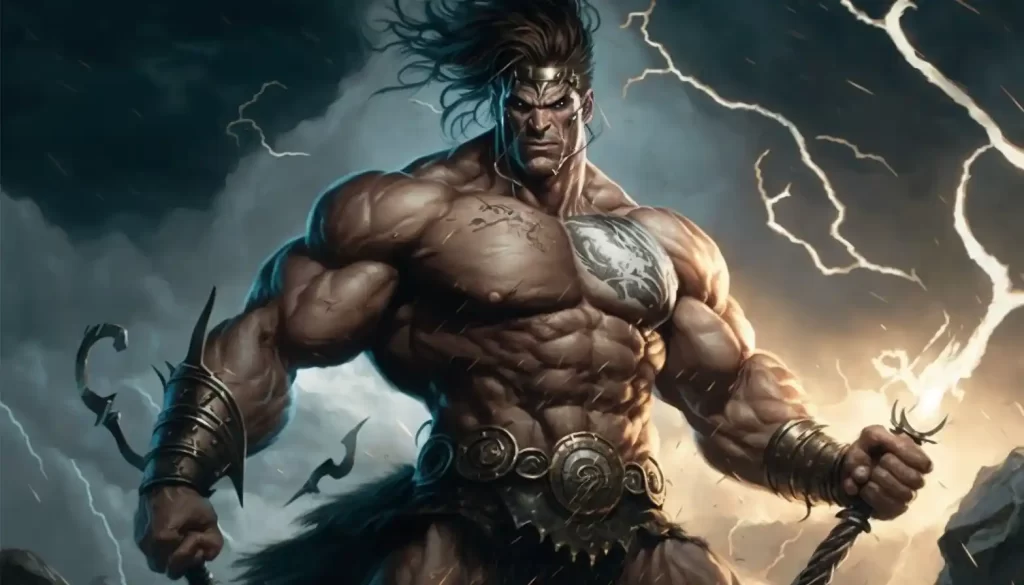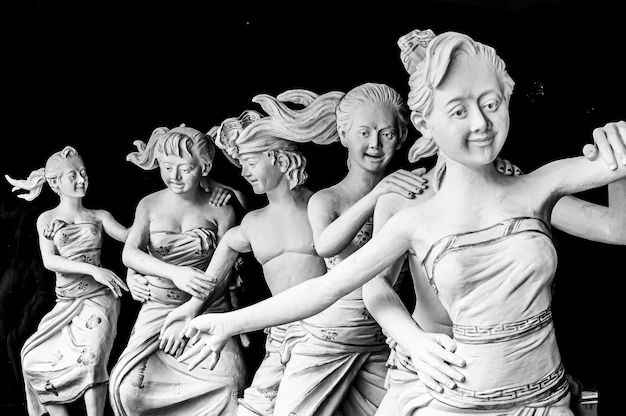Summarize this Article with:
Unleashing the Power of Hercules: The Mighty Greek God

Hercules is one of Greek mythology’s best-known figures. He is famous for his incredible strength, which allowed him to perform legendary feats and complete impossible tasks. Hercules was born as the son of Zeus, the king of the gods, and Alcmene, a mortal woman. However, his birth was complicated by the vengeful actions of Hera, the wife of Zeus and the goddess of marriage, who despised Hercules as the result of her husband’s infidelity.
Hercules’ story is a fascinating and complex one, filled with both triumphs and tragedies. His extraordinary abilities and numerous accomplishments have made him a beloved figure in Greek mythology, and his enduring legacy continues to captivate people to this day. Hercules is often depicted as the ultimate hero, embodying the values of courage, strength, and perseverance. Throughout his adventures, he faced countless challenges and overcame seemingly insurmountable obstacles, inspiring generations of people to strive for greatness.
You also would like to read Mighty Poseidon
In addition to his legendary strength, Hercules was also known for his intelligence and cunning, which he often used to outwit his enemies and accomplish his goals. He was considered one of the greatest warriors of his time, and his reputation as a god of war inspired fear in the hearts of his enemies. Despite his incredible power and status as a demigod, Hercules was not without his flaws. He often got into trouble because of his short temper and impulsive behavior, and he struggled with morality and personal responsibility throughout his life.
Overall, Hercules’ significance in Greek mythology cannot be overstated. His story has endured for thousands of years and continues to captivate and inspire people around the world. Whether as a symbol of strength and heroism or as a cautionary tale of the dangers of unchecked power, Hercules remains one of the most fascinating and compelling figures in all of mythology.
Hercules’ origin, parents, and Hera’s curse
Heracles was the son of Zeus and a mortal woman named Alcmene. Zeus, who had taken on the form of Alcmene’s husband, Amphitryon, impregnated her while her real husband was away fighting a war. When Amphitryon returned, he was surprised to find his wife already pregnant.
You also would like to read Athena Greek virgin goddess
Hera, the wife of Zeus, was furious when she learned of the affair and the resulting pregnancy. She despised Heracles as a symbol of Zeus’ infidelity and made it her mission to make his life as difficult as possible. Hera waited until Heracles was eight months old and then sent two snakes to kill him while he slept in his crib. Heracles, on the other hand, was very strong, even when he was a baby. He strangled the snakes with his bare hands, showing that he was very strong from a young age.
Hera’s curse did not end there, however. She continued to torment Heracles throughout his childhood, causing him to become angry and violent at times. Heracles had a twin brother named Iphicles, who was not born of Zeus, and the two grew up together. Despite their shared upbringing, Iphicles was always in awe of his brother’s incredible strength and abilities.
You also would like to read Nyx Greek Goddess
As Heracles grew older, he became increasingly restless and eager to prove himself as a great hero. He sought out the guidance of his cousin, the wise centaur Chiron, who taught him how to use his strength and intelligence to become a true hero. Soon after, Heracles went on a series of adventures and quests to show the gods that he was worthy and win their favor.
Despite the many challenges he faced and the obstacles thrown in his path by Hera and others, Heracles persevered and became one of the greatest heroes in Greek mythology. He was a true legend in his time because of how smart and strong he was, as well as how determined he was and how strongly he felt about doing what was right.
Hercules’ brothers and sisters
Heracles had several siblings, some of whom were also children of Zeus and others who were not. His most well-known brother was Iphicles, who was born to Alcmene and Amphitryon just before Heracles. Iphicles didn’t have the same amazing strength and skills as his brother, but he was still Heracles’ brave and loyal friend on all of his adventures.
Heracles also had several half-siblings on his father’s side, including the god of war Ares, the goddess of love Aphrodite, and the messenger god Hermes. These brothers and sisters had different roles in Heracles’ story. Ares was often an enemy or rival, while Hermes sometimes helped him on his quests.
You also would like to read God of Messages Hermes
On his mother’s side, Heracles had several other siblings, including a sister named Iole, who was the daughter of Eurytus, a king of Oechalia. Iole was a big part of one of Heracles’ most tragic stories, which was about his love for her that she didn’t return and the terrible things that happened because of it.
Another sister of Heracles was the goddess Hebe, who was the goddess of youth and the cupbearer of the gods. Hebe was often shown as young and beautiful, and she helped Heracles on a number of his adventures.
You also would like to read Medusa
While Heracles’ siblings were not always central to his story, they did play important roles in shaping his character and experiences. Together, they made a complicated web of connections and relationships that added to the rich and interesting myths about Heracles and his world.
Hercules’ strengths and weaknesses
Hercules, known for his extraordinary strength, is one of the most powerful figures in Greek mythology. His strength is legendary and has been the subject of many stories, including his famous twelve labors. Heracles was said to be able to lift entire mountains, and he was capable of defeating even the most formidable opponents with ease. The source of his strength was his divine parentage, as he was the son of Zeus, the king of the gods.
Despite his immense strength, Heracles was not without his weaknesses. His most prominent weakness was his temper, which often led him to act impulsively and sometimes violently. Heracles was known for his quick temper and his tendency to lash out at those who he perceived as his enemies. This temper often got him into trouble, and he was known to cause destruction and chaos in his anger.
You also would like to read Greek God Pan
Another of Heracles’ weaknesses was his vulnerability to deception. In several of his adventures, Heracles was tricked or deceived by his enemies, leading to dangerous and sometimes disastrous consequences. One of the most famous instances of this was when he was tricked into wearing a poisoned robe by his wife, Deianira, who had been manipulated by the centaur Nessus.
Heracles’ weaknesses were not just limited to his temper and vulnerability to deception. Despite his incredible strength, he was not invincible, and he could be wounded and even killed like any mortal. His vulnerability to harm was particularly evident in the story of his death, which was caused by a poisoned robe. Even Heracles’ strength was not enough to protect him from this deadly trap.
You also would like to read Mythological Creatures in ancient Greek
Overall, Heracles’ strengths and weaknesses made him a complex and fascinating figure in Greek mythology. Even though he was very strong physically, he had a short temper and was easy to trick. These qualities helped shape his personality and the many adventures he went on.
Hercules’ love affairs, family life, and children
Hercules, despite his incredible strength and heroic deeds, was not immune to the ups and downs of love and relationships. Throughout his life, he had several romantic relationships and family ties that were integral to his story.
Hercules was married to Megara, a princess from Thebes, with whom he had several children. Hera drove him insane, and he murdered his family. Hercules attempted to atone for his actions by undergoing the Twelve Labors. Hercules got immortality after he finished the labors, and he went on to have other relationships with women.
You also would like to read Aeneas: The Hero of Troy
One of Hercules’ most famous love affairs was with Deianira, whom he married after defeating the river god Achelous. However, their relationship was not without its challenges, as Deianira was later manipulated by the centaur Nessus into believing that Hercules was unfaithful to her. Nessus gave Deianira a cloak that he claimed would protect her from any future infidelity, but it was actually laced with a deadly poison. When Deianira gave the cloak to Hercules, it caused him tremendous pain, ultimately leading to his death.
Hercules also had several relationships with other women, including Omphale, Queen of Lydia, and Iole, the daughter of King Eurytus. In one of his most famous adventures, Hercules was sent by Eurytus to capture the Erymanthian boar, and it was during this adventure that he fell in love with Iole. Their relationship was not without its challenges, as Eurytus had promised Iole’s hand in marriage to another, leading to a tragic end for the couple.
You also would like to read Zagreus: The Prince of the Dead
Despite his many challenges in love and relationships, Hercules’ family ties were always important to him. His family, both before and after his trials, was a central part of his story and his motivation. His relationships with Megara and his children were especially important. They gave him a sense of stability and purpose in a life that was often chaotic.
Overall, Hercules’ love life and family ties were an essential part of his story, adding depth and complexity to his character and his many adventures. Even though Hercules had a larger-than-life reputation, his romantic relationships and family ties made him seem more real and helped people from different times and places relate to him.
Hercules’ Famous Conflicts and Wars
As a demigod, Hercules was constantly involved in conflicts and battles throughout his life. His great strength and incredible fighting skills made him a fearsome opponent, and he was revered as a hero by the people of Greece.
Nemean Lion: The story of the Nemean Lion, also known as the Lion of Cithaeron, is one of the most well-known episodes in the life of Hercules. According to legend, the Nemean Lion was a monstrous beast with impenetrable skin that could not be pierced by any weapon. The lion had been terrorising the countryside and killing livestock, and so Hercules was tasked with killing the beast as one of his twelve labors.
You also would like to read Mighty Hecatoncheires
Hercules first encountered the Nemean Lion in a cave in the mountains. He attempted to kill the lion with his bow and arrows, but the arrows simply bounced off the lion’s skin. Hercules realised that he would have to get up close and personal with the lion if he wanted to defeat it. He grappled with the lion and eventually managed to strangle it to death with his bare hands.
In some versions of the myth, the lion’s impenetrable skin was turned into a cape or a piece of armour that Hercules wore as a symbol of his great strength. In others, the skin became a constellation in the night sky.
Heralds of Erginus:
The Heralds of Erginus is a story from Greek mythology that details one of the many adventures of the legendary hero, Hercules. In this story, Hercules has to save the city of Thebes from a cruel and evil warlord named Erginus.
As the story goes, Erginus had been raiding the city of Thebes and demanding tribute from the citizens, who were unable to resist him. Hercules, hearing of the city’s plight, decided to take action. He assembled a band of warriors and marched to Thebes to challenge Erginus.
You also would like to read Tales of Ancient Greek Heroes
When they arrived, Hercules and his band were met by a group of heralds sent by Erginus to challenge them to battle. Hercules accepted the challenge, and the two sides fought fiercely. However, the heralds had been sent to the battle with a secret weapon: they had rubbed their bodies with oil, making them virtually impervious to any attacks.
Despite this, Hercules and his warriors were able to defeat the heralds and push back Erginus’ forces. In the end, Erginus himself was captured and brought before Hercules, who spared his life but forced him to swear an oath to never again attack Thebes.
You also would like to read List of Greek God
Hercules’ madness and the killing of his family One of the most tragic events in the life of Hercules was his descent into madness and the subsequent killing of his own family. The story goes that Hercules was struck with a fit of temporary insanity as a result of a curse put on him by the goddess Hera, who had always harboured a deep resentment towards him.
During this period of madness, Hercules became consumed with rage and committed a terrible crime. He killed his wife, Megara, and their children in a fit of rage and only came to when the deed was complete.
Overcome with grief and horror at what he had done, Hercules consulted the Oracle at Delphi to seek guidance on how he could atone for his terrible crime. The Oracle told him that he must serve King Eurystheus for twelve years and perform a series of twelve labours in order to redeem himself.
Hercules embarked on these labours with great determination and perseverance, using his strength and intelligence to overcome a series of seemingly impossible tasks, from slaying the Nemean Lion to capturing the Erymanthian boar.
You also would like to read List of Greek Goddesses
Although he was ultimately successful in completing the twelve labours and redeeming himself in the eyes of the gods, the memory of his family’s tragic death would always haunt Hercules. The story of Hercules’ madness and the killing of his family is often seen as a cautionary tale about the dangers of anger and uncontrolled violence, as well as a testament to the power of redemption and the human capacity for self-forgiveness.
Hercules’ involvement in the Trojan War
Hercules, being a legendary figure from ancient Greece, is often associated with the Trojan War, which is said to have taken place in the 12th century BC. However, while the stories of Hercules and the Trojan War are intertwined in Greek mythology, there is no clear account of his direct involvement in the war.
According to some sources, Hercules was said to have played a minor role in the early stages of the Trojan War, fighting alongside the Greeks against the Trojans. It is said that he sailed to Troy as part of the Greek fleet and was present during the famous “beauty contest” that sparked the war, where he sided with the Greek warrior Ajax in his dispute with the Trojan prince Paris over the beautiful Helen of Troy.
You also would like to read Zeus the king of God
Despite this initial involvement, however, there are no clear accounts of Hercules playing a major role in the later stages of the war, such as the Trojan Horse or the fall of Troy. In fact, some sources say he may not have been involved in the war at all because he was busy with other jobs and adventures all over Greece and beyond.
Despite his limited involvement in the actual events of the Trojan War, however, Hercules remains an important figure in the mythology and cultural memory of ancient Greece. His bravery, strength, and legendary deeds have given rise to many stories and legends, and his popularity and influence are still felt today.
You also would like to read Eros the God of Love
The Twelve Labors of Hercules
The Twelve Labors of Hercules are a series of superhuman feats accomplished by the mythical Greek hero Hercules. The labours were assigned to Hercules by his cousin King Eurystheus as a means of atonement for Hercules killing his family in a fit of madness.
- The first task was to kill the Nemean Lion, a monster said to be immune to weapons. Hercules succeeded in killing the lion by strangling it with his bare hands.
- The second labour was to slay the nine-headed Hydra, a massive water serpent. Hercules succeeded in slaying the Hydra by cutting off each of its heads and burning the remains.
- Capturing the Ceryneian Hind, a magical deer with golden antlers, was the third labor.Hercules succeeded in capturing the deer with the help of his companion, the goddess Athena.
- The fourth labour was to capture the Erymanthian boar, a monstrous pig that was causing destruction in the countryside. Hercules succeeded in capturing the boar by trapping it in a deep snowdrift.
- The fifth labour was to clean the Augean stables, which were filled with years’ worth of accumulated filth and waste. Hercules succeeded in cleaning the stables in a single day by diverting two rivers to flow through them.
- The sixth labour was to slay the Stymphalian Birds, a flock of vicious birds that were terrorising the countryside. Hercules succeeded in slaying the birds by using a rattle given to him by Athena to scare them away.
- The seventh labour was to capture the Cretan bull, a wild bull that was ravaging the island of Crete. Hercules succeeded in capturing the bull by lassoing it and dragging it back to King Eurystheus.
- The eighth labour was to obtain the mares of Diomedes, a savage king who fed his horses the flesh of human captives. Hercules succeeded in capturing the mares by feeding Diomedes to them in his stead.
- The ninth labour was to obtain the girdle of Hippolyta, the queen of the Amazons. Hercules succeeded in obtaining the girdle by defeating Hippolyta in a wrestling match.
- The tenth labour was to obtain the cattle of the monster Geryon. Hercules succeeded in obtaining the cattle by slaying Geryon and his two-headed guard dog.
- The eleventh labour was to obtain the golden apples of the Hesperides. Hercules succeeded in obtaining the apples by enlisting the help of Atlas, the Titan who held up the heavens.
- The twelfth and final labour was to capture Cerberus, the three-headed guardian of the underworld. Hercules succeeded in capturing Cerberus by subduing him with chains and dragging him back to the surface.
Hercules as a God of War and his enemies
Hercules, also known as Heracles, was widely revered as the god of strength in ancient Greek mythology. He was also linked to war and military power, and warriors and soldiers worshipped him as their god.
Hercules’ reputation as a god of war was primarily due to his incredible physical strength and his legendary battles against various enemies. In many stories, he is shown as a brave and skilled warrior who can beat whole armies by himself.
However, Hercules’ connection to war was not universally celebrated in Greek mythology. Ares, the god of war, was often depicted as a rival to Hercules, and the two were said to have engaged in numerous conflicts and battles.
Hercules was not only disliked by Ares but also by other gods who thought he was rude and cocky. For example, Apollo was said to have been angered by Hercules’ killing of the sacred deer of Artemis, and as a result, the god placed a curse on him.
Hercules’ Death and Legacy
Hercules’ death is a subject of some debate in Greek mythology, with multiple versions of the story. In some versions, Hercules was poisoned by his wife, Deianira, who was tricked into doing so by the centaur Nessus. In other stories, Hercules died after completing his labours because he was sick or tired.
Regardless of the specifics, Hercules’ death marked the end of his mortal life and the beginning of his ascension to godhood. The ancient Greeks later worshipped him as a god, and his legacy has lasted through the years.
Hercules’ enduring popularity can be attributed in part to his impressive physical strength and his larger-than-life persona. He was a hero who overcame problems that seemed impossible to solve and showed constant bravery in the face of danger.
Interesting facts about Hercules
- Heracles (or Hercules) is one of the most famous and celebrated figures of Greek mythology. He is often considered the archetype of the hero.
- Hercules is famous for his great strength, which he got by doing a set of 12 tasks, or “labors.”
- Despite his status as a hero and god, Hercules was not without his flaws. He was known for his temper and had a tendency to act impulsively.
- The name “Hercules” is derived from the Latin name for the Greek god Heracles. The name Heracles means “glory of Hera.”
- Hercules is often depicted carrying a club, which was one of his signature weapons. He is also sometimes shown wearing the skin of the Nemean lion, which was one of his most famous exploits.
- Hercules was not only worshipped in ancient Greece, but his cult spread to Rome and other parts of the ancient world. He was also revered by the Etruscans, a pre-Roman civilization.
- In addition to being a god of war and heroism, Hercules was also associated with agriculture and fertility. He was sometimes called upon to bring rain and ensure a bountiful harvest.
- Hercules was the son of Zeus, the king of the gods, and a mortal woman named Alcmene. He had a number of famous siblings, including Athena, Apollo, and Hermes.
- The constellation of Hercules is named after the hero. It is one of the largest constellations in the night sky and is visible from both the northern and southern hemispheres.
- Hercules has been the subject of countless works of art, literature, and film. From ancient Greek pottery to modern superhero comics, his story continues to captivate and inspire people around the world.
Conclusion
Hercules is one of the most well-known figures in Greek mythology. He was revered for his incredible strength, and his story is one of triumph and tragedy. From his birth and early life to his famous conflicts and wars, such as the Twelve Labors, Heracles left a significant mark on Greek mythology. Despite his godly status, he was not without flaws, including his temper and vulnerability to deception. Nonetheless, his legend endures, and he continues to be celebrated in popular culture today.
Hercules’ story is also a reminder of the power of myth and the enduring legacy of ancient cultures. The character of Hercules has been adapted and reimagined in countless forms, from literature to film and beyond, showcasing his ongoing influence on modern culture. We are still interested in this mythical hero’s story hundreds of years after it was first told, which shows how appealing he is.
Hey kids, how much did you like Unleashing the Power of Hercules: The Mighty Greek God? Please share your view in the comment box. Also, please share this story with your friends on social media so they can also enjoy it, and for more such stories, please bookmark storiespub.com.
Check out other stories that we have:
- 1. Hindi Stories
- 2. Panchatantra stories
- 3. Moral Stories
- 4. Bed Time Stories
- 5. How to Draw
- 6. Scary stories for kids
- 7. Mythological Stories











